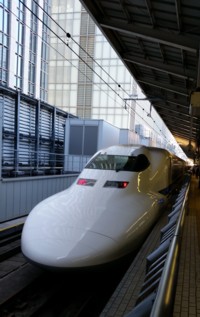Yokohama
The following day the tour organisers had promised a ride on a Shinkansen (bullet train) to Yokohama. I was looking forward to this. I'd see a partial train or mock-up in various museums, most recently in the Rail Museum in York in England. Here was the real thing. But somehow it was an anti-climax.
Shinkansen - bullet train
It's famously capable of 300km/hr but nowadays lots of trains we've been on in both Europe and China approach this speed and on this occasion we were only going two stops, at nowhere near top speed. As if to rub that in, the bus dropped us off at the station and then the same bus, with our luggage and other left possessions on board, met us at Yokohama station. The driver had his feet up waiting for us. To be fair, there was a lot of messing about before the train departed. I, for one, kept our guide on her toes when I and one other got seduced into briefly following 'Group A' who were on their way to an earlier train (we were Group B). But despite some time consuming and obviously futile searching of toilets we still didn't miss our famously punctual train.
It appears that one of the main tourist attractions in Yokohama is the Cupnoodles (Momofuku Ando Instant Ramen) Museum that celebrates the invention of this particularly synthetic fast snack beloved by those who want something high in carbohydrates and quick to eat as when skiing and those who are lazy and/or have no concern for their children's health. Japan is a great place to have invented a fastfood. If you aren't using a vending machine simply to order a meal in a food hall you can get almost any snack or drink you can think of directly from a vending machine. In some places these form vast walls of choice - from not too bad to atrocious.
Back in 1958 Japan was still reeling from its defeat in World War Two. There was a shortage of rice, the traditional staple, but plenty of wheat had been provided as foreign aid from places like Australia and the US. Momofuku Ando started experimenting with wheat based, ramen, noodles in his back shed. He found that deep frying them made them acceptable to the Japanese pallet and when dried the noodles could be restored by boiling. His ramen noodle business was born. Later, on a trip to America he saw instant (freeze dried) soup in a paper cup and realised that if extruded finely enough and tangled into a nest to provide enough space around them his already cooked noodles could be made instantly edible, just by adding hot or even lukewarm water. So why not combine a nest of them with instant soup to create a meal in a cup. The museum goes to some lengths to explain that the inverted method of packing them into the cup was his next great invention. Eureka! - or whatever that is in Japanese. Thus the Cupnoodles Museum takes us on this journey of hardship; discovery and innovation. And you can even make your own cup-a-noodles in the workshop. In the process, Ando San is raised to the status of a demigod, as are the founders of most large corporations in Japan.
I wasn't a great fan but then what else is there to do in Yokohama?
Making your own at the Cupnoodles Museum and ubiquitous vending machines
Well actually, Yokohama is interesting historically, so there must be quite a bit more to it than noodles and cherry blossoms.

